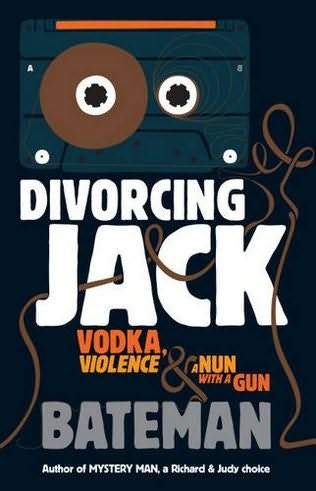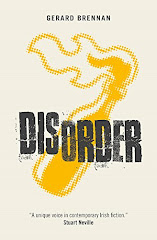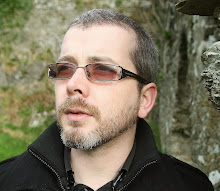Come one, come all! See the freakishly humungous blog post!
The Carnival of the Criminal Minds has made its way to Northern Ireland after a stint at Michael Walters's
The Shadow Walker blog. Except here it’s not a carnival, it’s a funfair. It’s not cotton candy, it’s candyfloss. And I’m pretty sure that’s boke in the front cab of the ghost train, not puke.
Barbara Fister was kind enough to get in touch and invite me to host the Carnival here, and I readily accepted. I hope she doesn’t regret the decision, as I decided to shake things up and take a look at crime movies rather than crime fiction novels, just for a wee change.
You see, I’m working on a screenplay right now and watching a hell of a lot of movies for inspiration. And I realised that a lot of my viewing choices were movies with some sort of Irish element to them. So, after a quick flick through the pages of
IMDB, I chose ten movies from my collection that span the last ten years and could be considered Irish crime. It made for some pretty relaxing research.
Enjoy!
Ten Years of Irish Crime MoviesDivorcing Jack (1998) 
Based on the novel by Colin Bateman, Divorcing Jack was the first movie to tackle the Troubles from a humorous angle. And this when the peace talks were still on very rocky grounds! Bateman deserves recognition for having the balls to do this at all, but add to it the fact that it’s been done well... you’ve got a modern classic in Divorcing Jack, both in print and on the screen.
And it’s an excellent book-to-movie conversion, which isn’t always the case. Maybe this has something to do with the fact that Mr Bateman himself wrote the script?
David Thewlis puts in a very convincing attempt at being a Northern Irish man. His accent, mannerisms and facial expressions are all bang on. In every Dan Starkey novel since, I’ve imagined Thewlis as the lead man.
Loved this movie.
 The Boondock Saints (1999)
The Boondock Saints (1999)
Two Irish-American brothers turn vigilante in this veritable bloodbath of a gangster movie. A simple plot with little in the way of twists and turns, but it’s a cult classic and I’m for signing myself into this particular cult. The brothers believe they have been chosen by God to clean up the mean streets, and if their divine luck is anything to go by, there’s a case to be argued. Each mission they go on gets bigger and more dangerous, and that’s just good TV. And they have the good sense to bring a length of rope along with their guns and knives, like any good vigilante should.
I love this movie for its tough-guy dialogue and hair-raising shootouts and its contentious message. And the weirdo FBI agent played by Willem Dafoe is an absolute treat.
Ordinary Decent Criminal (2000) 
Ordinary Decent Criminal is the story of Michael Lynch, a notorious Dublin bank robber and general ne’er-do-well, played by Kevin Spacey. It’s a bit of a light-hearted romp that’s funny in places, but overall it was spoiled by the fact that the American actors sounded like American actors trying to put on Oirish accents. And it was a thinly veiled history of real-life Dublin criminal, Martin Cahill. This story was tackled with much more style and a lead actor with a decent Irish accent in The General, starring Brendan Gleeson as Cahill. Both Ordinary Decent Criminal and The General were funny and poignant in places, but the latter was more violent, which is truer to the reality of criminality. Also, The General didn’t end on a schmaltzy Hollywood note. Ordinary Decent Criminal positively wallowed in it.
Oirish is to the Irish as Blaxploitation is to the African American community; stereotypical, mostly insulting, but occasionally entertaining. Ordinary Decent Criminal is worth a look, if only to see Colin Farrell in a very early role, but of no great relevance to Irish crime movies. Watch
The General instead.
 Snatch (2000)
Snatch (2000)A Guy Ritchie flick with a tenuous Irish connection. Brad Pitt plays the Irish Traveller/bare knuckle boxer, Mickey. Pitt’s accent is so thick it requires subtitles, and I think it’s quite good. This may not be a popular opinion, as Pitt has gotten a lot of flack for this and other accents, but come on, the guy’s okay. I particularly enjoyed his trailer park accent in Kalifornia. And in Snatch he’s playing a character a little removed from his past pretty-boy roles. Of course, he still looks a lot better than me, even when he’s dressed in Traveller chic and is inked from head to toe in woeful tattoos.
I like the energy in this movie, and the multiple perspectives of the characters. The plot strands are well tied together by the denouement and Vinny Jones comes across as the mean bugger he is.
Road to Perdition (2002) 
Set in the 1930s, Road to Perdition is an Irish-American Gangster movie. It’s got all the hallmarks of a classic, number one being a comparison to The Godfather on the cover. At first I was struck by how slowly the film moved. But this may have been a deliberate device. I think it could be a nod to a time when movies didn’t have to be chock-a-block action squeezed into ninety minutes. And I guess I’ve been affected by the quick-fix mentality of our generation, as I was checking my watch for most of the first half.
However, I eventually relaxed into the pace and found myself enjoying a heart-wrenching story. The father-son theme running throughout was subtle and used to terrific effect. Hanks made, surprisingly, a very good strong silent type as the hitman Michael Sullivan. Jude Law was slightly less convincing, but I allowed for the dodgy accent and enjoyed his quirkiness. Paul Newman was Paul Newman. Enough said.
 25th Hour (2002)
25th Hour (2002)A Spike Lee joint. Edward Norton heads a strong cast in the story of a drug dealer’s last night of freedom before his seven year prison sentence begins. It’s set in post-9/11 New York and was filmed at a time when emotions were still very raw. The general feeling of outrage screams through the main plot in many places; not least the scene in an apartment with a view of Ground Zero.
There are a few stylistic flourishes that actually work well for the mood of the film, my favourite being a rant about NYC by Norton’s reflection. Yeah, his reflection. Like I told you, stylish.
It’s a very good film with a tonne of killer one-liners, such as, “
I'm Irish. I can't get drunk, all right? I know exactly what I'm saying.”
Intermission (2003) 
This film doesn’t seem to have gone down well with many people, and I just don’t know why. I thought it was a cracker. Great cast, great story, great film. It’s the tale of a gang of feckless eejits who’ve decided to step up for once in their lives and do something big. And profitable. And criminal, obviously. But the involvement of one true scumbag, Colin Farrell’s Lehiff, has drawn the unwanted attention of an egomaniacal psycho-cop.
One warning. Don’t try adding brown sauce to your tea after watching this flick. It’s stinking.
 Man About Dog (2004)
Man About Dog (2004)Man About Dog wants to be a Guy Ritchie film, which is a decent enough aspiration. It doesn’t quite make it though. The humour is too zany and there’s not enough violence. This isn’t to say that it’s a bad movie. It just isn’t Snatch with more balls, as the cover proclaims it to be. But I liked it, though I tend to be more lenient with movies set in Belfast.
A trio of Belfast scammers lead by Mo Chara (meaning ‘my friend’ in Irish) try to make it in the cutthroat world of greyhound racing. They mix it up with gangsters, travellers and beautiful Russian babes. The movie is good for a few genuine Belfast belly laughs, but don’t expect anything too cerebral from it. Still, a genuine attempt to set a movie in Belfast that doesn’t centre on the Troubles, and I’m all for that.
The Departed (2006) 
It’s Scorsese again! And this time the gangsters are Irish! And it’s brilliant! Right, enough with the exclamation marks.
In The Departed, Leonardo DiCaprio and Matt Damon play a couple of moles on each side of the law. DiCaprio is a cop posing as a crook and Damon a crook posing as a cop. And it’s not an easy life for either of them. You can hear the bile eating through their stomach linings. I mean, my God, who’d have a job like that? The stress would kill you.
Jack Nicholson puts in his standard crazy guy performance, and predictably, I ate it up. I think Jack’s the man. And Martin Sheen, Alec Baldwin and Mark Wahlberg each do their bit to raise the cast profile. This is a big, suspenseful movie, and it dishes out enjoyment in spades.
 Once (2007)
Once (2007)
This one’s sneaking its way onto the list. Once isn’t really a crime story at all. It’s actually more of a modern day musical. You couldn’t get much further from crime, really. But it is Irish to the core, and absolutely brilliant! And there’s a half-hearted robbery scene at the start, so that’ll do.
Glen Hansard puts across a fantastic performance, but as a singer more so than an actor. The story is a straight forward ‘will they, won’t they?’ romance, but what sets it above the usually dull genre is the music. Heartfelt and beautiful songs play a central role and I got a kick out of every wailing note. And it’s an interesting look into modern-day Dublin, seeing life from the lowlier rungs of society through a busker and an immigrant cleaner. But the music... Yeah, I’m going to buy the soundtrack sometime this week.
In Bruges (2008) 
So, In Bruges. Brendan Gleeson, Colin Farrell and Ralph Fiennes. Two great Irish actors and one great English one as the bad guy. It was written by Martin McDonagh, who cut his teeth in the Irish Theatre scene. And the movie’s tone is as Irish as an American tourist’s ancestry. Plus, it’s set in... Belgium? Okay.
Right, I can deal with Belgium, even if Colin Farrell’s character can’t.
In Bruges is the story of two hitmen lying low after a botched job, and how they’re not so good at keeping a low profile. This film is one part hilarity and two parts bleak, bleak, bleakness. The cast is perfect and the pace bang on. I laughed and fought back tears (my wife was sitting beside me so I couldn’t bawl freely). And the storyline hit all the right buttons. The film’s super-dark undercurrent really embodies the best of Irish cinema. I couldn’t give it a higher recommendation. So, go. Watch it now!

































